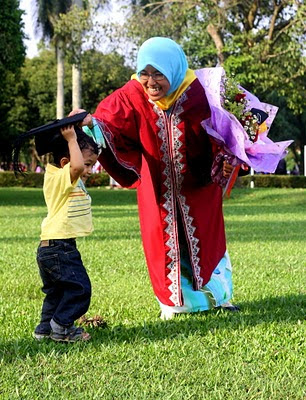When your kid was little, you made him feel special in the way you cooed to him and played with him; whispering loving words while you fed him, making funny faces when you bathed him and singing lullabies at bedtime.
As he grows older, you may find fewer opportunities to show him how special he is to you. Especially when he's becoming an individual in his own right, with his own daily schedule of busy activities as a toddler or pre-schooler. He may not slow down to give you a cuddle or kiss. If he has started school, he may also feel it's 'uncool' to be hugged or kissed in full view of his peers.
Fortunately, there're lots of things you can do to make your kid feel special at every stage of growth. Here are some of them:
- Help your kid recognize what makes him unique and special. Parents should make a point of acknowledging valuable traits such as honesty, courage, insight and creativity, giving praise when praise is due.
- Praise as much as you wish but make sure that it is sincere. Be specific when praising. For example, if you're praising his drawing, say exactly what you like about it. Remarks like 'I love the colors you've used' or 'You've made the birds look so real!' will convince your kid that you truly think he's done something special.
- Talk to your kid about things that really matter to him - school, lessons, friends teachers, anything at all they want to share with you from their daily life. When you take the time to really listen t him and understand what he's trying to communicate, you'll make him feel valued and special.
- Understand your kid's own unique rhythms and temperaments, and respect them. Instead of trying to change a night owl into an early bird or introvert into the life of the party, accept and love your kid for the person that he is - just as you expect others to accept and love you the way you are.
- Give your kid as much one-on-one time as you can. If you have more than one kid, find ways to spend time alone with each of your kids. Make a habit of taking one kid with you on an outing - to the shops, market, library, etc. Or better yet, get a family friend or relative to child-sit one night each week so that you and your spouse can take one of your kids out to a movie or dinner. If you rotate kids from week to week, each kid will have the chance of spending some glorious two-on-one time with both of you, and these experiences will be treasured into his adult years.
- Celebrate regularly. Don't hold out for major achievements or milestones. Celebrate all the little things that deserve to be savoured on a day-to-day basis - the first goal of the game, a positive comment from a teacher at school, an exceptionally tidy bedroom and so on.
- Let your kid know that you will be there for him in both good times and bad, and that you will do whatever you can to help him get through the rough times. At the time when he's at his most vulnerable, show him you believe in him and will help him over the hurdle with assuring words like, 'Let's see how we can solve the problem.'
- Laugh with your kid. There's nothing like shared laughter to foster a bond between parent and child. Sharing an inside joke reminds your kid that he has a very special place in your heart.
- Share stories about yourself when you were kid. Tell him about the time you failed your math test, had a fight with your best friends, or lost your cat. Most important of all, be the first to admit it if you've made a mistake, particularly if that mistake affects your kid. Say, 'Sorry about that. Let's wipe clean the slate and start all over again, shall we?'
- Above all, remember that making your kid feel special is one of your most important tasks as a parent. A parent's praise and reassuring presence are the most effective tools for building a kid's self-esteem.




























